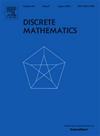On the combinatorial structure and algebraic characterizations of distance-regular digraphs
IF 0.7
3区 数学
Q2 MATHEMATICS
引用次数: 0
Abstract
Let denote a simple strongly connected digraph with vertex set X, diameter D, and let denote the set of distance-i matrices of Γ. Let denote a partition of , where . In the literature, such a digraph Γ is said to be distance-regular if is a commutative association scheme. In this paper, we provide a combinatorial definition of a distance-regular digraph in terms of equitable partitions. From this definition, we rediscover all well-known algebraic characterizations of such digraphs, including the above one. We also give several new characterizations, and one of them is the spectral excess theorem for distance-regular digraphs.
距离正则有向图的组合结构及其代数表征
设Γ=Γ(A)表示顶点集X,直径D的简单强连通有向图,设{A0,A:=A1,A2,…,AD}表示Γ的距离i矩阵集。设{Ri}i=0D表示X×X的一个分区,其中Ri={(x,y)∈X×X|(Ai)xy=1}(0≤i≤D)。在文献中,如果(X,{Ri}i=0D)是可交换关联方案,则称有向图Γ是距离正则的。在本文中,我们给出了距离正则有向图的一个组合定义。从这个定义中,我们重新发现了所有已知的有向图的代数刻画,包括上面的有向图。我们还给出了几个新的刻画,其中一个是距离正则有向图的谱过剩定理。
本文章由计算机程序翻译,如有差异,请以英文原文为准。
求助全文
约1分钟内获得全文
求助全文
来源期刊

Discrete Mathematics
数学-数学
CiteScore
1.50
自引率
12.50%
发文量
424
审稿时长
6 months
期刊介绍:
Discrete Mathematics provides a common forum for significant research in many areas of discrete mathematics and combinatorics. Among the fields covered by Discrete Mathematics are graph and hypergraph theory, enumeration, coding theory, block designs, the combinatorics of partially ordered sets, extremal set theory, matroid theory, algebraic combinatorics, discrete geometry, matrices, and discrete probability theory.
Items in the journal include research articles (Contributions or Notes, depending on length) and survey/expository articles (Perspectives). Efforts are made to process the submission of Notes (short articles) quickly. The Perspectives section features expository articles accessible to a broad audience that cast new light or present unifying points of view on well-known or insufficiently-known topics.
 求助内容:
求助内容: 应助结果提醒方式:
应助结果提醒方式:


